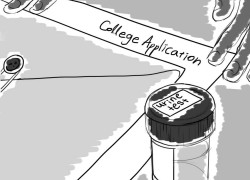
Linn State Technical College, a small technical school outside of Linn, Mo., with an enrollment of only 1,200 students recently decided it was in the best interest of the school to make drug testing mandatory for enrollment, becoming the first university in the country to do so.
Normally, the administrative decisions of Linn State Technical College are of little importance to anyone outside of the city of Linn. Though it might seem irrelevant, this policy is a direct infringement on students’ right to privacy.
Under the new rule, LSTC would require every new student to take urine tests at their own expense within the first five to 10 days of the school year, or they must withdraw from the university.
If a student tests positive, he or she is given 45 days to test cleanly to stay at the school. Afterward, the student is subject to random testing throughout the rest of the year, again at the risk of being kicked out of school.
No matter the reasons LSTC gives for testing its students, such as “preparing their students for a profitable future,” mandatory drug testing is too much of an invasion into its students’ lives to be an acceptable rule. Privacy goes out the window when school-wide testing is implemented, and any benefits gained from this testing are overly stained by the precedent it sets about the ability of schools to regulate students’ lives.
How does the university defend this paranoid solution to combat drug use? LSTC insists the consummate college is different from that of conventional universities, in that the vast majority of its programs deal with high-voltage electricity, heavy equipment or caustic chemicals.
Naturally, mixing these types of fields with drugs can lead to very dangerous situations. There is a difference, however, between banning drugs, a perfectly reasonable regulation, and implementing mandatory drug testing upon the entirety of a student body. If someone is careless enough to come to a class that deals with dangerous chemicals while under the influence of other dangerous chemicals, he or she deserves to be severely punished or expelled from the school.
The threat of expulsion certainly seems a more sane deterrent against the dangerous use of drugs while completing school coursework. The administration at LSTC, however, needs to understand the difference between these two solutions.
The American Civil Liberties Union sees the dangers to individual student rights created by this radical approach. The ACLU is suing the university over this rule, citing the obvious disregard for individual students’ right to privacy.
If the lawsuit comes out favorably, this action will hopefully cause LSTC to revert to a more practical approach against drug use by its students.
The university’s concern about the dangers an intoxicated student would pose to himself and his classmates is valid. Still the potential danger of one careless student does not justify the violation of the entire student body’s privacy by testing without any initial suspicion.
Thankfully, this kind of thinking is not ignored by groups like the ACLU, even in institutes of higher education as small as LSTC.
Violation of student rights is something that should not be tolerated in any scale; if it were allowed unchecked in somewhere small like Linn, it would run the risk of setting a precedent that would spread to more immediately relevant areas.
